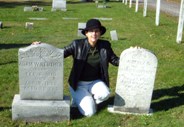
On August 16, 1927, Herman Klobe received a blow from an axe to the back of his head. The wound was four inches long and penetrated his skull to his brain. He died several days later at Lock Haven Hospital on August 22.
Joseph Huntingdon was accused of the crime. In January 1928, he was tried and acquitted of the crime. There were conflicting accounts of the crime from the eye witnesses and from the accused. The jury believed Joseph. No one else was indicted for Herman's murder, and the crime went unpunished.
In the spring of 1927, Joseph Huntingdon, along with Earl Knepp, was hired by Floyd Klobe, Herman's son, to make moonshine whisky. The 1920's were a time of Prohibition, and the sale and manufacture of alcoholic beverages was against the law across the United States.
On the fatal day, August 16, Huntingdon asked Floyd Klobe for the money owed to him - $300, and also asked Floyd about reports that Floyd wanted to run him out of the county. Floyd denied he owed Huntingdon anything, and offered him $25. The two then got into a fist fight with Huntingdon receiving such a blow to his chest from Floyd that he was knocked out. When he came to, he remonstrated with Floyd on his treatment, and again asked for his money. Floyd then picked up a butcher knife from the table and attacked Huntingdon. As he backed away, Huntingdon picked up an axe and struck out at Floyd, hitting him in the head.
At this point the accounts of Huntingdon and the witnesses differs.
According to Huntingdon, at this time Herman's son Charles and Charles' son Glenn showed up. Huntingdon left the house he was living in and where the argument occurred, and taking Charles Klobe's car, fled as he was afraid of Floyd.
According to Floyd, he and Earl Knepp left Huntingdon's house after the first fight, then went back to check on Huntingdon. Upon arriving at the house, Huntingdon came out with an axe and struck Floyd over the head. Then Herman came around the side of the house, and Huntingdon also struck him in the head. Charles Klobe, who also testified, arrived at the house about 8 in the evening, after hearing shouting and found his father lying on the ground. It was at this point, according to Floyd and Charles, that Huntingdon escaped in Charles' car.
Earl Knepp's testimony was similar to Floyd's and Charles' testimony. He also testified that he, Huntingdon and Floyd had been drinking throughout the day, but were not intoxicated. Knepp testified that Herman collapsed where he stood when he was hit in the head with the axe, and then later stated that he had walked almost 200 feet before collapsing. The doctors who testified said that Herman still suffered the effects from an earlier stroke, and was partially paralyzed. In addition, with a head wound that severe, Herman could not have walked that far after being struck, and he would have lost consciousness almost immediately.
Joseph Huntingdon was acquitted of murder, and the jurors stated they did not have much faith in the testimony of eyewitness Earl Knepp.
The above synopsis of the trial is taken from articles published in the Renovo Record and Lock Haven Express newspapers in January 1928. Originally written by C. Reuther, November 2004